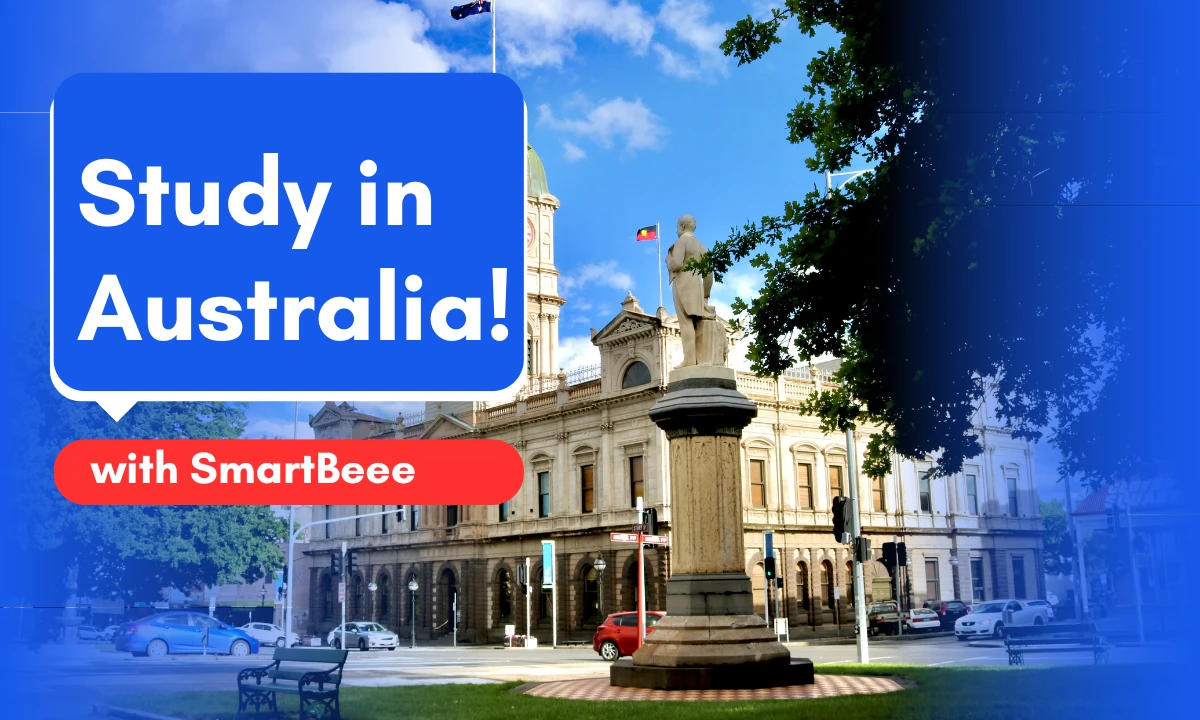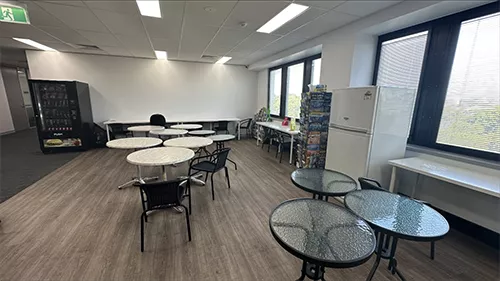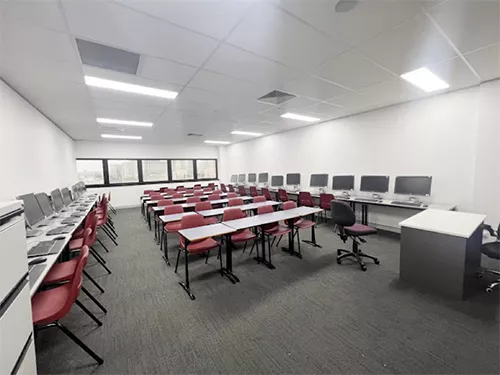Why Australia?


Do you want to study in Australia? Australia is a top choice for international students. It has great universities, many courses, and good job opportunities after graduation.
We Help Students Around the Globe
At SmartBeee, we understand that every student has unique needs, especially when studying abroad. We offer personalised consulting and support services to students from the UK, Bangladesh, India, Pakistan, Ghana, and Nigeria. These students want to study in Australia.
For Students from the UK
UK students benefit from applying to Australian universities that offer high-quality education and globally recognised degrees. SmartBeee helps you find the right program for your interests and career goals. This is true for both undergraduate and postgraduate courses. Our team will help you with the visa application process. We will make sure you meet the English language requirements. We will also give you advice on living in Australia.
For Students from Bangladesh
We understand the challenges that students from Bangladesh face when applying to study abroad. From gathering the right documents to finding affordable options, we support you every step of the way. Whether you are interested in engineering, business, or healthcare, we connect you with universities that offer the best courses. We also help with scholarships, visa processing, and finding affordable accommodation in Australia.
For Students from India
India is one of the largest sources of international students in Australia. At SmartBeee, we know what it takes for Indian students to succeed. From understanding the visa requirements to securing post-study work opportunities, we offer tailored advice and guidance. We also help you choose between the best universities and affordable study options, ensuring your Australian study experience is academically rewarding and financially manageable.
For Students from Pakistan
Pakistan is known for its strong academic background, and many Pakistani students are choosing Australia for higher education. SmartBeee helps students from Pakistan with course selection, visa guidance, and tips on adjusting to life in Australia. We offer a personalised approach, ensuring you meet all the necessary academic and language proficiency requirements. We also assist with scholarships and other financial support to make studying in Australia more affordable.
For Students from Ghana
Ghanaian students are increasingly interested in studying in Australia. SmartBeee offers guidance on choosing the right course based on your career goals, admission requirements, and English proficiency tests. We understand Ghanaian students’ challenges, so we provide step-by-step assistance in completing the university application process. We also offer advice on living costs, health insurance, and finding student accommodation.
For Students from Nigeria
Nigeria has a large number of students aspiring to study in Australia. At SmartBeee, we help Nigerian students access the best Australian universities, offering top business, IT, engineering, and healthcare courses. We provide visa support, scholarship guidance, and advice on living expenses. We make sure you have all the information you need. This helps you apply for student visas. We want your move to Australia to be as smooth as possible.
Why Study in Australia?
Australia is home to some of the best universities in the world. Studying in Australia gives you:
- High-Quality Education: Australian universities offer modern facilities, practical learning, and globally recognised degrees.
- Many Course Choices: You can study business, engineering, medicine, IT, law, arts, and more.
- Post-Study Work Options: You can apply for a post-study work visa to get job experience after graduation.
- Safe and Friendly Environment: Australia is safe, multicultural, and welcoming for international students.
SmartBeee – Your Study in Australia Experts
At SmartBeee, we help students from the UK, Bangladesh, India, Pakistan, Ghana, and Nigeria achieve their study dreams.
How We Help You
✔ Find the Best University – We help you choose the right university and course.
✔ Application Assistance – We make sure your university application is complete.
✔ Visa Guidance – We help with the student visa process for smooth approval.
✔ Accommodation & Travel Support – We assist in finding a place to stay and preparing for your journey.
Requirements for Studying in Australia
To study in Australia, you need:
Academic Requirements
- Undergraduate Degree: A high school certificate or equivalent.
- Postgraduate Degree: A bachelor’s degree from a recognised institution.
English Language Requirement
- Most universities need an IELTS score of 6.0 – 7.5. Some accept TOEFL or PTE instead.
Student Visa Requirements
To get a student visa, you must provide:
- A valid passport
- An offer letter from an Australian university
- Proof of funds for tuition and living costs
- Health insurance (OSHC)
Cost of Studying in Australia
Here’s an estimate of what you may need:
💰 Tuition Fees: AU$20,000 – AU$45,000 per year
💰 Living Expenses: AU$18,000 – AU$25,000 per year
💰 Health Insurance (OSHC): AU$500 – AU$700 per year
Scholarships are available to help reduce costs.
Can You Study in Australia Without IELTS?
Yes! Some universities accept students without IELTS if they:
- Studied in English before.
- Take an alternative test like PTE or TOEFL.
- Complete a university language course.
SmartBeee can help you find the right university!
Why Choose SmartBeee?
✅ Trusted Experts – We guide you step by step.
✅ Personalised Support – We help based on your needs.
✅ Visa Assistance – We make your visa process easy.
✅ Proven Success – Hundreds of students have studied abroad with our help.
Why choose NAPS?
At NAPS, we are global innovators in Business higher education who provide you with a supportive program of study and a vibrant student community. We effectively use technology for business and learning and help equip you to do the same. We will work with you to help you attain a highly sought after, globally-focussed professional education and the practical skills you need for respect and success in the workplace and beyond.
NAPS is an institution that is committed to becoming a leader in global business education which is why it is the first Australian higher education provider to offer a Bachelor’s degree in Islamic Business and also Islamic specialist business units which can be taken as part of an accounting degree.
NAPS’ mission is to provide an education that is student-centred and facilitates professional-readiness as well as an international outlook.
The Academy’s program of study is designed to prepare students for professional success in the many different careers for which a business degree serves as a useful or required qualification. Practical skills and values are infused throughout the curriculum and the Experiential Program continues to be developed.
Academic rigour is mandated through a uniform attendance policy, multiple assessments and examinations that require analysis. Courses are specifically designed to teach skills and values. Study outside the classroom and co-curricular activities are organised for a full educational experience.
Each student is assigned an academic staff mentor. Our staff reflect the diversity of our student body and global expertise and many are multi-lingual.
Effective use of information technology permeates the Academy. The NAPS Library and Skills Hub provide excellent access to online resources. Students also have access to nearby university libraries with community access rights to be paid by NAPS.
Each student will be given assistance to produce a Professional ePortfolio if they wish to do so. This is recommended as it is an excellent way to showcase their skills to prospective employers.
The Academy’s campus provides ample space for the needs of the academic program, professional skills training, faculty offices, support staff, library, and various student activities and organizations. It has been designed to be consistent with the school’s emphasis on student-centred interaction, creating professionally prepared graduates. The technological capabilities of the building and equipment are state-of-the-art, and there also is sufficient student access to quiet study and research areas, including space for group study and collaborative work.
The Academy is located in Chalmers Street, next to Sydney’s Central Station and near Sydney’s CBD, making finding good public transport, shops, cafes and Sydney’s parks and harbour easy.
NAPS’ academic staff consists of educators and practitioners who have significant teaching or practice backgrounds and currency within the business community. They participate in continuous self-improvement through “Best Practices in Teaching” sessions and regular feedback from students and peers.
They are committed to teaching, scholarship, student mentoring and public service. Some of the teaching staff have earned teaching awards and/or have developed national reputations for their scholarship. Scholarship is supported and facilitated and supported by conference travel and teaching relief.
Consistent with the Academy’s commitment to diversity, NAPS has attracted, appointed, and will continue to recruit faculty from a variety of backgrounds and experiences.
The Academy’s administration has significant experience in higher education institutions and benefits from access to others with knowledge and expertise. The Board of Directors and Council, the Academic Board and Executive team are formed from national and international experts in their fields.
Advantages of NAPS
The Academy offers high quality facilities in an excellent professional and central location.
We hope we will have the opportunity to welcome you to NAPS. Contact us anytime to arrange a campus tour. To find out about our Orientation Program, download our brochure NAPS’ location near Sydney’s central business district (CBD) - the commercial heart of Sydney -makes it a perfect place to prepare for a global, professional career while enjoying the best of the Australian lifestyle.The Academy's campus is located at:
Level 4, 136 Chalmers Street Surry Hills NSW 2010 Australia The campus is close to transport, shops, cafes, major libraries and the offices of hundreds of businesses, there are also eating places that offer Halal options nearby.
The campus is close to transport, shops, cafes, major libraries and the offices of hundreds of businesses, there are also eating places that offer Halal options nearby.
Our central location makes it easy to co-run events where NAPS students can interact with local professionals. It also makes it easier for city-based workers to improve their qualifications during day or evening classes.
The Academy’s campus provides ample space for the needs of the academic program, professional skills training, academics' offices, support staff, library, and various student activities and organisations. It has been designed to be consistent with the School’s emphasis on student-centred interaction, creating professionally prepared graduates. The technological capabilities of the building and equipment are state-of-the-art, and there also is sufficient student access to quiet study and research areas, including space for group study and collaborative work.
International students particularly appreciate Sydney’s multi-cultural welcome, great weather and outdoor lifestyle. NAPS student services team encourage and support students as they savour the Sydney learning experience.
 Chalmers Street is next to Central Station in Sydney; and Sydney’s beautiful Hyde Park is just around the corner from the Academy. After a NAPS class, you may choose to walk through the park, past the Cathedral and the NSW Art Gallery, see office workers relaxing with a touch football game in the Domain and then cross into Sydney’s stunning Botanic Gardens.
Chalmers Street is next to Central Station in Sydney; and Sydney’s beautiful Hyde Park is just around the corner from the Academy. After a NAPS class, you may choose to walk through the park, past the Cathedral and the NSW Art Gallery, see office workers relaxing with a touch football game in the Domain and then cross into Sydney’s stunning Botanic Gardens.
As you explore the gardens, you will find yourself at the Harbour foreshore then follow the joggers who are keeping fit while admiring the stunning city and Harbour views. Their route will take you to the entrance to the Sydney Opera House where you can watch the seagulls steal chips from the locals at one of the Harbourside outdoor restaurants before taking a shorter route through shop-lined streets and malls to return to NAPS.
Universities and Courses
The country has 43 universities located across state capitals and regional areas, so with some research you're bound to find the perfect place to settle.
Institutions offer thousands of courses in a range of subjects, from science and humanities to management and engineering. Australia's education structure is similar to that in the UK and you can study for Bachelors, Masters and Doctorates.
For a full list of Australian universities see Study in Australia - List of universities.
When it comes to university world rankings Australia has an impressive track record. Seven of the country's institutions feature in the QS World University Rankings 2021 top 100. These include:
- Australian National University
- The University of Melbourne
- The University of Sydney
- University of New South Wales
- The University of Queensland
- Monash University
- The University of Western Australia.
The country's oldest research universities comprise the Group of Eight (Go8) including Australian National University, Monash University and the universities of Adelaide, Melbourne, New South Wales, Queensland, Sydney and Western Australia.
Melbourne is the most popular student city according to the QS Best Student Cities 2022. Two other locations - Sydney and Brisbane - make up the top 30, with Adelaide, Perth and Canberra coming in the top 40.
The academic year usually starts in February but this can vary depending on your institution and level of study.
Bachelors programmes typically take three years to complete (four years for an honours degree). They're generally split into two semesters, although some universities offer three.
An undergraduate degree helps to develop the skills and knowledge you'll need to work in your chosen field and enables you to pursue postgraduate studies.
Entry onto Australian higher education programmes is competitive and to gain a place on a course you'll need a high school leaver's certificate or equivalent. You'll also need to prove your level of English proficiency if it's not your first language. Additional entry requirements for some programmes may include the successful completion of work experience, a portfolio or audition
Australian Masters follow a similar format to those in the UK and usually take one or two years to complete. Qualifications awarded from Australian institutions are globally recognised and well respected by employers, standing you in good stead upon graduation.
Institutions in the country offer a range of taught and research-based Masters in areas such as creative arts, engineering, health, education and sciences to name just a few. Like in the UK, you'll be able to study a Masters of Arts (MA) or Master of Science (MSc). Courses focus on either traditional coursework (taught courses) or independent research (research courses), or a combination of both.
In Australia you’ll also be able to study a 'Change of direction' Masters - for students looking to change subject pathways and a 'Professional development' Masters - for students looking to further their careers through additional training.
Entry requirements for Masters programmes in Australia vary depending on your university and subject but basic requirements include the successful completion of a Bachelors degree, with most looking for students who hold a minimum of a 2:1 or 2:2 grade.
Other postgraduate qualifications on offer include:
- Graduate certificates
- Graduate Diplomas
- Doctoral degrees.
The Doctoral degree, or PhD, is usually a pure research degree and the highest qualification awarded by Australian universities. They typically take three years to complete and are undertaken on completion of a Masters qualification.
The Doctoral degree is a research programme made up of three components:
- a review of literature, experimentation or other methodical approach to a body of knowledge
- an original research project that contributes to understanding and knowledge in your field
- a thesis that demonstrates a relationship between the research and the field of study.
In terms of assessment, you'll submit a written thesis, but unlike in other countries you won't need to orally defend your work.
The cost of higher education in Australia is among the most expensive in the world. Fees are set by universities, not the government so the cost of postgraduate study can vary widely. International students will pay considerably more than Australian students and foreign students are also required to pay their tuition fees before they start their course.
Despite the increased cost of study the country remains popular with foreign students.
You can expect to pay anywhere between $20,000 to $37,000 (£10,748 to £19,883) for a Masters degree and $14,000 to $37,000 for a Doctoral degree (£7,523 to £19,883). All costs are per-year in Australian dollars.
These estimates do not include high-value courses such as veterinary science, medicine and the Masters of Business Administration (MBA) where you should expect to pay considerably more.


